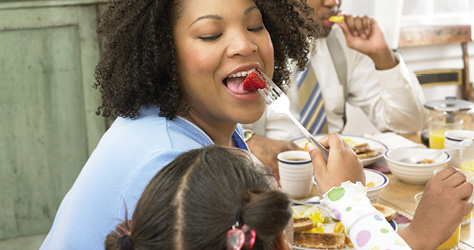We've got ten ways to get your little one to eat up
If you’re getting stressed at mealtimes because your toddler won’t eat, don’t worry – it’s very common. Here are some tips to encourage them to eat up.
At a glance
- Watch out they’re not filling up on calorie-heavy drinks like milk or juice before a meal
- Avoid diversions like TV and DVDs during meals if you can
- Show a good example yourself: if you don’t eat veg, your little one may not either

- Watch out they’re not filling up on calorie-heavy drinks like milk or juice before a meal. If you take the edge off a two or three-year-old’s appetite they are unlikely to eat a proper meal. They need to be properly hungry. So avoid snacks an hour to and hour and a half before a meal too
- Put at least one food you know they like on their plates, but try to offer them a small portion of something new as well. Don’t cook a completely different meal if they won’t eat what you’ve put in front of them: you already know there’s something on their plate they like, and anyway, they may not eat the second meal, either
- Try to avoid falling back on the old favourites every meal. It’s tempting to serve peas every time if they’re the only vegetable your little one is keen on, but what do you do when the inevitable happens and they get fed up with peas? Better to keep offering different veg – in small portions, alongside the peas if necessary
- If they are really tired they’re unlikely to eat. Perhaps save the meal for after a nap and give them a small snack for now
- Avoid diversions like TV and DVDs during mealtimes if you can. It often distracts them so much they don’t eat at all
- Remember it’s possible for your pre-schooler to get a reasonably healthy diet even it is quite limited. If the only fruit and veg they’ll eat at the moment are grapes and carrots, they’ll be fine. Keep offering new foods, stay calm and they’ll accept them in time
- Try not to use pudding as a reward if they finish their dinner, as it can make the main course seem even more like a trial. A healthy pudding is an important part of the meal: fruit salad and natural yoghurt or fruit crumble and custard are good options
- Show a good example yourself: if you don’t eat veg, your little one may not either. Let them see you eating the same food they’ve got – that’s why it’s good to eat meals with them as often as you can
- Accept that you’ll get bad days. View their diet over a week or fortnight rather than trying to achieve a perfectly balanced meal every single time, which is unrealistic for lots of two to four-year-olds.
- Stay calm and take the emotion out of it. If you have a disastrous mealtime, try to forget it and move on. Don’t over-analyse it – two-year-olds are not always predictable. Don’t panic - you’ll get there in the end!
We’ve got more advice for dealing with picky eaters